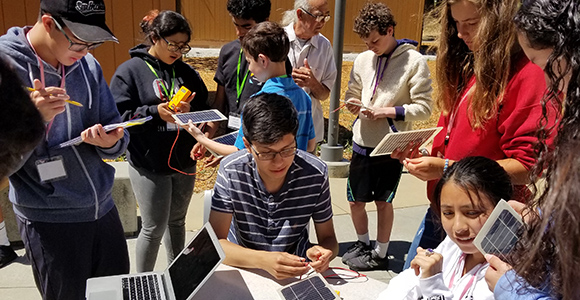
(Photo Credit: Energize Colleges)
The California Economic Summit’s challenge to train one million more skilled workers is a reflection that the Golden State’s workforce needs to be better prepared for the jobs in our fast changing 21st-century economy.
During the past year, Summit team members traveled the state with Van Ton-Quinlivan, executive vice chancellor for Workforce and Digital Futures, California Community Colleges, to discuss the future of work with employers, leaders and educators in nearly two dozen different areas of California.
“Having completed 22 Future of Work MeetUps in cities of all types across California – urban, rural, suburban and affluent to struggling – I can attest to a common angst as communities anticipate how artificial intelligence and increased automation will impact the workplace,” said Ton-Quinlivan. “Employers and workers both want a playbook to future-proof and increase economic resiliency.”
Workers face several barriers, among them financial challenges and fitting college studies in between work and life responsibilities. These workers are “stranded” by technology and can’t access the current community college system because they either don't have time to commute to school because of family and work obligations or simply because they live too far away. There are over eight million stranded workers in California, with 2.5 million of those under the age of 35.
Governor Brown signed legislation creating a California online community college to create a more flexible approach to competency-based education that can help many of them realize the California Dream.
“The online college is designed to let students go as fast as they want, with flexible start times to earn an industry valued credential, ” said Van Ton-Quinlivan.
Employers in the state not only have an immediate need to fill the skilled workers pipeline, but a fast-changing economy where employees must be reskilled often to keep pace with technological and competitive advances.
The Community Colleges are consolidating and expanding their work with California employers in ten different economic sectors to make sure that the system is nimbler in developing and offering Career Technical Education courses that can help meet that demand.
For the 2018 California Economic Summit attendees, who will gather in Santa Rosa on November 15-16, will have developing a skilled workforce prominent on its agenda.
Having more skilled workers not only meets the demands of employers but also creates more middle-income jobs, which can help more working-class Californians expand the state’s shrinking middle class.
The Summit is also exploring workforce innovations in the gig economy, which is attracting tens of thousands of workers to flexible but irregular employment. This rapidly growing sector is employing more and more people with upwards of 30 percent of the workforce already engaged in the gig economy. Businesses save resources in terms of benefits, office space and training. But what about the employee? What does their future look like? The Summit will dig into that issue.
To help students and workers advance careers or stay ahead of workplace automation, the Summit will also examine financial support and other ways to help students’ complete programs sooner at lower personal costs and make it easier to tap into training dollars. The Summit plans to discuss how current workforce and education investments, including financial aid policies, needs to be significantly re-imagined, elevating lifelong as a key tool to ensure our workforce and state can compete with the evolution of technology.
Finally, one of the winners from this year’s second annual Partnerships for Industry and Education (PIE) Contest – a competition to honor employer-education partnerships across the state – will lead a discussion on ways the Summit network can grow, strengthen and institutionalize successful partnerships. Public-private partnerships are another pivotal way for California to ensure a competitive workforce.
The California Economic Summit has emerged as the only statewide venue with a comprehensive agenda for taking on the challenges of our time: reducing income inequality, increasing economic security and community resiliency in a time of climate change, bolstering wealth generation, and restoring upward mobility.
Register for the 2018 Summit to participate in the work to advance shared prosperity across the state.

